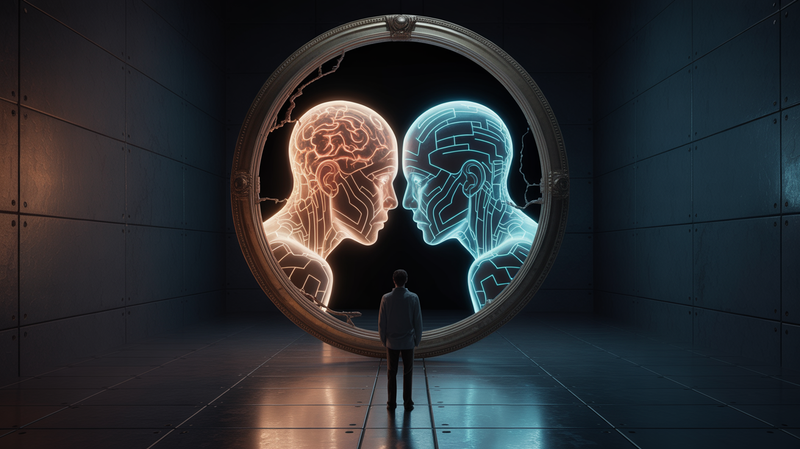Social Stratification from Proletariat to the Digital Age: The Rise of the "Unnecessary" Class
Social stratification, or the hierarchical arrangement of people in a society, has always been a salient feature of human civilization. The way this stratification manifests and evolves is closely linked with the technological and socio-economic transitions of the times. From the proletariat of the Industrial Revolution to the digital divide

Social stratification, or the hierarchical arrangement of people in a society, has always been a salient feature of human civilization. The way this stratification manifests and evolves is closely linked with the technological and socio-economic transitions of the times. From the proletariat of the Industrial Revolution to the digital divide of the 21st century, class distinctions have been both formed and reinforced by societal changes. In this article, we'll explore the historical context of the proletariat, the implications of the digital revolution, and the emerging concept of an "unnecessary" class.
The Proletariat and Industrial Capitalism
The rise of the proletariat is intertwined with the Industrial Revolution, which spanned from the late 18th to the early 19th century. With the advent of machinery, large factories, and urbanization, a vast majority of people transitioned from agrarian lifestyles to wage labor in urban centers. These workers, or the proletariat, often labored under tough conditions, for long hours, and received minimal wages. This stark contrast between the wealthy elite or bourgeoisie, who owned the means of production, and the struggling proletariat intensified social disparities.
The Digital Revolution and New Age Stratification
Fast forward to the late 20th and early 21st centuries, and we witness another monumental shift – the Digital Revolution. As the world became more interconnected with the internet and sophisticated technologies, new avenues of wealth, influence, and power emerged. Those who could access and control these digital tools found themselves in an advantageous position, creating a digital divide between the tech-savvy and the tech-illiterate.
The Emergence of the "Unnecessary" Class
With the proliferation of Artificial Intelligence (AI), robotics, and advanced automation, a new challenge arises: the potential redundancy of human labor in certain sectors. Yuval Noah Harari, a historian and philosopher, introduced the term "useless class" or "unnecessary class" to describe individuals who might find themselves without economic or societal value in a hyper-automated world. This isn't just about unemployment but about a group of people who might be perceived as not being essential to the functioning of a highly technologized society.
This concept isn't merely speculative. For instance, as self-driving vehicles become more reliable, what becomes of millions of truck drivers, taxi drivers, and delivery personnel? As AI systems can diagnose medical conditions, predict stock market trends, or write articles, many professions might be at risk.
Implications and Ethical Concerns
The emergence of an "unnecessary" class raises profound ethical and socio-political questions. If a significant portion of the population is deemed "unnecessary" for economic productivity:
- How will societal values shift?
- What happens to concepts of self-worth and identity?
- How will wealth be distributed, and what safety nets will exist for those left behind?
Furthermore, it emphasizes the importance of redefining education and skills training for the new age, focusing on qualities and capabilities that machines can't replicate or replace.
From the proletariat of the Industrial Age to the potential "unnecessary" class of the Digital Age, societal stratifications reflect the dynamics and challenges of their times. As we stand on the brink of unparalleled technological advancements, it's crucial to address the potential disparities they might create and ensure an inclusive, compassionate, and ethical future for all.
The "Unnecessary" Class of the Future: Digitally Regulated Lives in the Age of Sustainability
The rise of the "unnecessary" or "useless" class, as coined by thinkers like Yuval Noah Harari, heralds an era where significant portions of the population might find themselves marginalized in a technologically advanced society. In a world where automation and AI might render several professions redundant, how does society ensure stability, sustainability, and inclusivity? This article delves into the potential future of the "useless class," examining systems of equal distribution, digital regulation, and the implications on societal values.
Equal Distribution and Food Aid
As traditional employment wanes, there's a growing need for a robust distribution system ensuring that all members of society have access to basic necessities. One proposal is a Universal Basic Income (UBI), an unconditional financial payment to all citizens, ensuring they can afford life's basics. Alongside this, an efficient and equal food distribution system might emerge, leveraging technology to track, manage, and ensure that everyone gets their fair share, preventing hoarding or wastage.
Ecological Footprint & Digital Regulation
In the face of looming ecological crises, there's a growing emphasis on minimizing individual carbon footprints. For the "unnecessary" class, digital technologies might monitor and limit their consumption. IoT devices, smart homes, and personal digital assistants might track an individual's consumption patterns, ensuring they do not exceed a sustainable threshold. This digital oversight, while ensuring eco-sustainability, could also raise concerns about privacy and individual freedom.
The 15-Minute Cities and Digital Law Enforcement
The concept of the "15-minute city" envisions urban spaces where all essential services are within a 15-minute walk or bike ride. For the "unnecessary" class, residing in such cities might become the norm. To manage the dense populations and maintain order, digital law enforcement systems, employing a points and rating mechanism, could emerge. Individuals might be awarded or deducted points based on their behavior, adherence to regulations, and consumption patterns. High scores might grant privileges, while low scores could lead to restrictions.
Addressing the Critical Questions:
Shifting Societal Values: In a world where digital monitoring becomes the norm, values like autonomy, privacy, and freedom might be redefined. Collective well-being and ecological sustainability might become paramount, possibly at the cost of individual liberties.
Concepts of Self-worth and Identity: As traditional roles fade, individuals might seek purpose and identity outside of work. Arts, hobbies, community services, or virtual realities might become avenues for self-expression and self-worth.
Wealth Distribution & Safety Nets: Beyond UBI, other safety nets might include mental health support, skill retraining programs, and community-based initiatives. The notion of wealth might transition from mere accumulation to ensuring holistic well-being for all.
Conclusion
The potential future of the "unnecessary" class is both fascinating and fraught with challenges. As society grapples with technological advancements, ecological imperatives, and evolving definitions of identity and value, the roadmap to ensuring an inclusive and harmonious world becomes complex. It's a journey that demands both technological innovation and profound introspection.




